| |
|
Atlas-country

|
Israel
|
|
|
|
|
|
|
|
ישראל \ إسرائيل
|
|
|
|
| עברית
|
[1] ישראל - מדינת ישראל
מדינת ישראל (ערבית: دولة إسرائيل, תעתיק: דאולת איסראאיל) היא דמוקרטיה פרלמנטרית הנמצאת במזרח התיכון, לחוף הים התיכון ומוגדרת כמדינה יהודית ודמוקרטית. רוב תושבי המדינה הם יהודים, אך יש בה מיעוט גדול של ערבים מוסלמים, וקבוצות מיעוט אחרות. ישראל גובלת בים התיכון ובמצרים במערב, בים סוף בדרום, בירדן במזרח, בסוריה בצפון-מזרח ובלבנון בצפון. בין ישראל למצרים, לחוף הים התיכון, נמצאת רצועת עזה, שהיא שטח בשליטת הרשות הפלסטינית. באזור ההר המרכזי שבין ישראל לירדן נמצאת הגדה המערבית, הידועה גם כיהודה ושומרון, שטח שנמצא בשליטה משולבת של ישראל והרשות הפלסטינית ומעמדו הסופי טרם הוכרע. בין ישראל לסוריה נמצאת רמת הגולן, שטח שסופח לישראל ב-1967, אך סוריה ממשיכה לתבוע ריבונות עליו.
|
| العربية
|
[2] إسرائيل - دولة إسرائيل
دولة إسرائيل (بالعبرية: מדינת ישראל; مدينات ايسرايل) هي ديمقراطية برلمانية في الشرق الأوسط تعتبر حسب قوانينها دولة يهودية وديمقراطية. يعتبر معظم مواطني الدولة يهودا بديانتهم أو بقوميتهم، ولكن من بينهم أقلية عربية كبيرة من المسلمين والمسيحيين وكذلك من الدروز ويطلق عليهم مسمى عرب إسرائيل.
تأسست دولة إسرائيل في 14 أيار/مايو 1948م حيث تم إعلانها من قبل المجلس اليهودي الصهيوني في فلسطين في اليوم المتمم لفترة الانتداب البريطاني حسب قرار الأمم المتحدة، وفي ظل حرب بين العرب واليهود أسفرت عن النكبة الفلسطينية وإبادة الكثير من المدن والقرى الفلسطينية حيث أصبح سكانها لاجئين في الضفة الغربية وقطاع غزة وفي بعض البلدان العربية. وقد أعلنت دولة إسرائيل هدفا لها استقبال اليهود الذين تم ترحيلهم من شرقي أوروبا خلال الحرب العالمية الثانية وتوطينهم في الدولة اليهودية، وكذلك استقبال اليهود من جميع أنحاء العالم.
|
| Русский[3]
|
Израиль - Государство Израиль[4]
Израиль — еврейское государство на Ближнем Востоке, на восточном побережье Средиземного моря. На севере граничит с Ливаном, на северо-востоке — с Сирией, на востоке — с Иорданией, на юго-западе — с Египтом.
|
| ייִדיש[5]
|
ארץ ישראל - מדינת ישׂראל
ארץ ישראל איז דער אידישער לאנד אין מערב אזיע, אינערהאַלב די גרעניצן פֿון לאַנד, ארץ ישראל, עקזיסטירט הײַנט די שטאַט מדינת ישראל, געגרינדערט ה'תש"ח (1948) דורך די אינטערווענץ פֿון די ציוניסטישע פֿיהרער, הויפּטזעכליך טעראריסטישע באַנדעס. אנדערש ווי אלע לענדער, וואו דאָס לאַנד איז דאָס הײַמאָרט צו די אַלע וועלכע געהערן זיך אָהן צו די רעליגיע פֿון לאנד, איז אָבּער מדינת ישראל דעמאקראטיש וואס איז טיילווייז קעגנזאץ צו די אידישע רעליגיע, טראָצדעם וואָס זי טראָגט אויסערליך דעם
|
| Ladino[6]
|
Yisrael - Yisrael
Medinat Yisrael es un estado en Asia mediocentral. La su kapital politika es Yerushalayim. Proklamada en 1980 komo kapital "unika e indivisible" de Yisrael, la majoria de los paises mantienen sus embasadas en Tel Aviv, ama su status komo kapital del Estado no a sido rekonosida internasionalmente, salvo por los Estados Unidos.
|
| Français
|
Israël - État d’Israël
Israël est un pays du Proche-Orient situé sur la côte orientale de la Méditerranée. Depuis sa création en 1948, il se définit comme l’État du peuple juif, héritier de l’Israël biblique. Il est le seul pays où l’hébreu est langue officielle ; son régime politique est de type démocratie parlementaire.
L’État d’Israël a connu, depuis sa création en 1948, de successifs conflits armés avec les pays arabes voisins.
|
| English
|
Israel - State of Israel
The State of Israel is a country in the Western Asian Levant, on the southeastern edge of the Mediterranean Sea. It borders ► Lebanon on the north, ► Syria and ► Jordan on the east, and ► Egypt on the south-west. It has a population of over seven million people. Israel declared independence in 1948 and is the world's only Jewish state, although its citizens include many other religious backgrounds, among whom Christians and Muslims make up the most notable percentage. Israel has the ► Palestine territories of the West Bank and Gaza under control.
|
|
|
|
| Short name
|
Israel
|
| Official name
|
State of Israel
|
| Status
|
Independent country since 1948
|
| Location
|
Middle East
|
| Capital
|
ירושלים (Jerusalem)[7]
القُدس
|
| Population
|
9,187,000 inhabitants
|
| Area
|
20,770 square kilometres (8,020 sq mi)
|
| Major languages
|
Hebrew and Arabic (both official)
|
| Major religions
|
Judaism and Islam
|
| More information
|
Israel, Geography of Israel, History of Israel and Politics of Israel
|
| More images
|
Israel - Israel (Category).
|
|

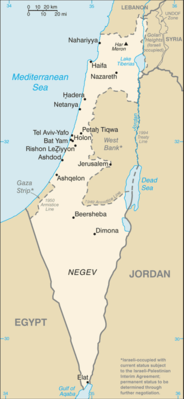

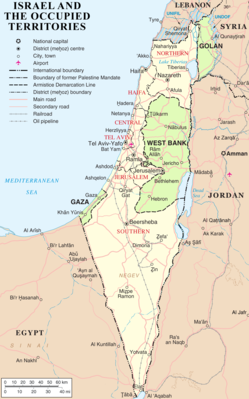
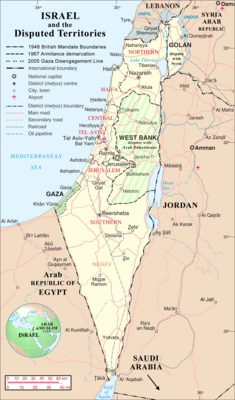











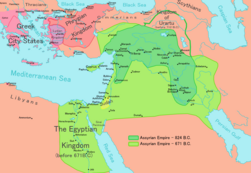
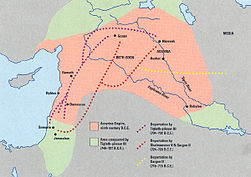
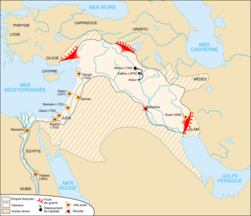







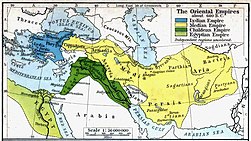
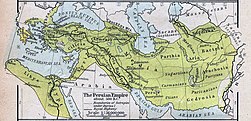
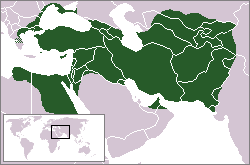





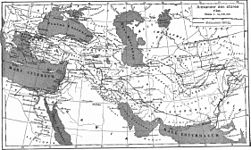
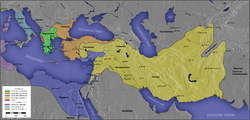




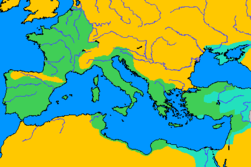




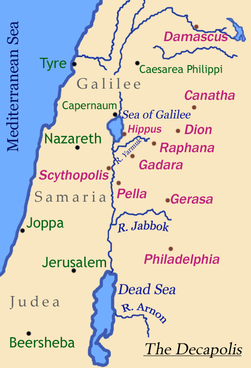




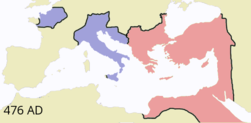
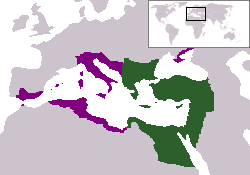



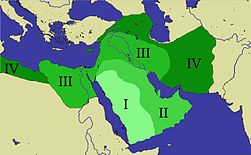

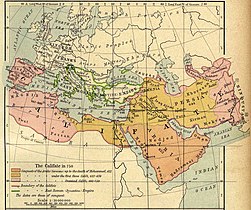
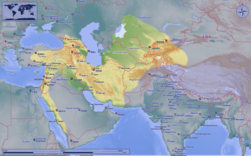


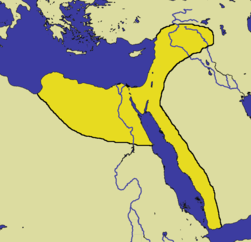












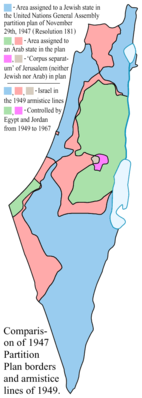














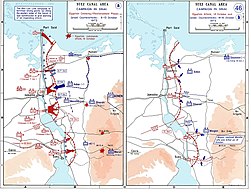
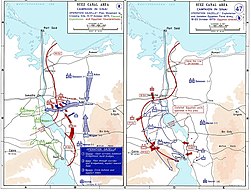

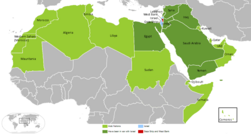
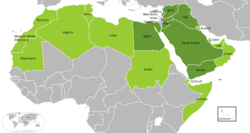







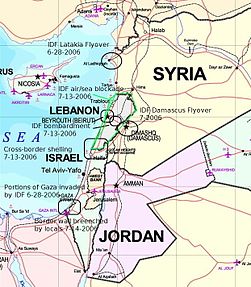
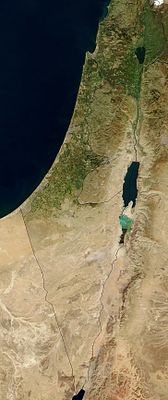











![Geographical distribution of the main ethno-cultural communities Jerusalem, Tel-Aviv and Central districts.[8]](https://upload.wikimedia.org/wikipedia/commons/thumb/b/b0/Geographical_distribution_of_the_main_ethno-cultural_communities_Jerusalem%2C_Tel-Aviv_and_Central_districts.jpg/113px-Geographical_distribution_of_the_main_ethno-cultural_communities_Jerusalem%2C_Tel-Aviv_and_Central_districts.jpg)
![Geographical distribution of the main ethno-cultural communities of Southern district.[8]](https://upload.wikimedia.org/wikipedia/commons/thumb/8/83/Geographycal_distribution_of_the_main_ethno-cultural_communities_Southern_district.jpg/120px-Geographycal_distribution_of_the_main_ethno-cultural_communities_Southern_district.jpg)